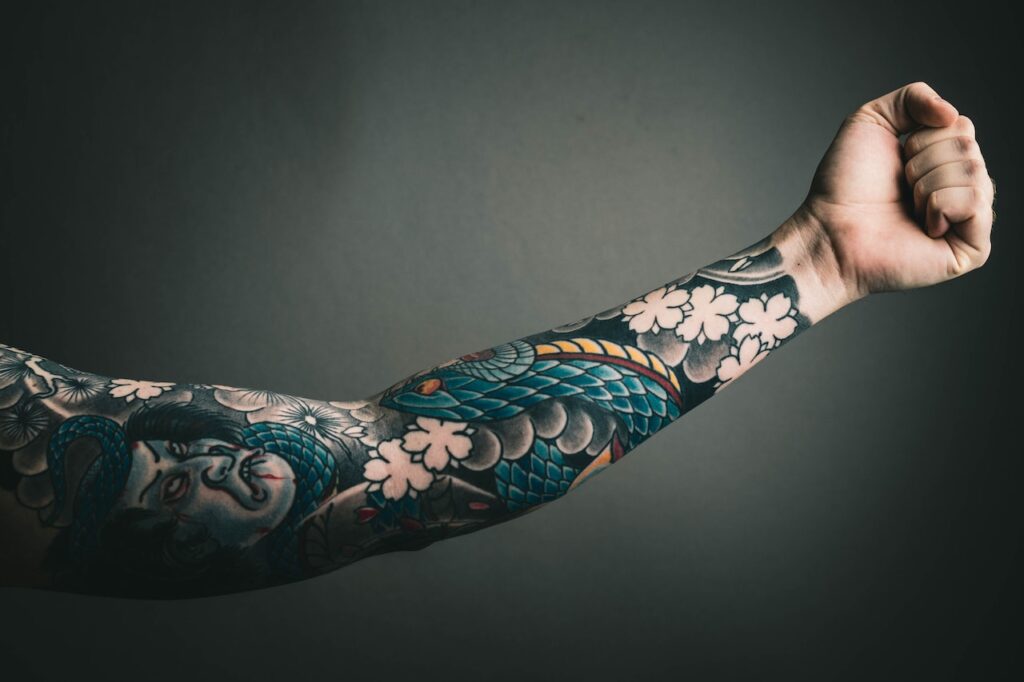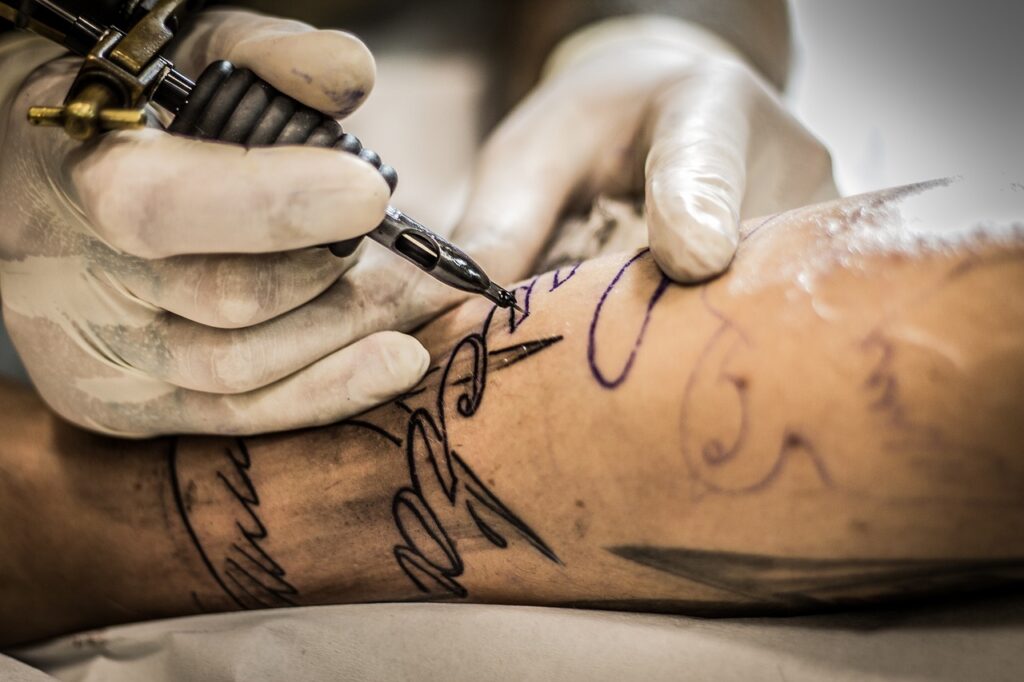Congratulations on your new tattoo! Tattoos are not only beautiful forms of self-expression but also meaningful symbols that stay with us for a lifetime. As you embark on this exciting journey, it’s essential to understand the vital aspect of aftercare to ensure your tattoo heals properly and retains its vibrancy. However, it’s common to experience a nagging itch during the healing process, which can be quite bothersome. In this guide, we’ll delve into the art of tattoo itching and explore effective ways to relieve the discomfort, ensuring your tattoo heals flawlessly.

What Causes Tattoo Itching?
The Role of the Body’s Healing Mechanism
Tattoo itching is a natural part of the healing process as your body works diligently to repair the skin after getting inked. When a tattoo needle penetrates the outer layer of your skin, it creates thousands of tiny wounds. As your body initiates its healing mechanism, the immune system responds, triggering the release of histamines and other chemicals. These chemicals cause the nerve endings around the tattooed area to become sensitive, resulting in that incessant itching sensation.
Potential Allergic Reactions or Infections
While some level of itching is expected, it’s crucial to be mindful of any unusual or excessive itching. In rare cases, individuals may experience an allergic reaction to tattoo ink or the aftercare products being used. Allergic reactions can lead to severe itching, redness, rashes, and even blistering. Additionally, if proper aftercare is not followed, the tattooed area may become susceptible to infections, which can further intensify the itching and delay the healing process.
Differentiation Between Normal and Abnormal Itching
Distinguishing between normal tattoo itching and abnormal reactions is essential. Normal itching tends to subside after a few days and can be managed with proper aftercare. On the other hand, abnormal itching, characterized by extreme discomfort, prolonged duration, and visible signs of inflammation, requires immediate attention. If you suspect an allergic reaction or infection, it’s essential to seek professional advice from your tattoo artist or a dermatologist to address the issue promptly.
How to Relieve Itchy New Tattoo
Keep the Tattoo Clean and Moisturized
One of the fundamental ways to alleviate tattoo itching is by maintaining proper cleanliness and moisture. As mentioned earlier, using mild, fragrance-free cleansers during washing helps prevent skin irritation. After gently patting the tattoo dry, applying a recommended tattoo aftercare product, such as an ointment or lotion with soothing ingredients like shea butter or aloe vera, can significantly reduce itching and keep the skin hydrated throughout the healing process.
Avoid Scratching the Tattoo
While the temptation to scratch a persistently itchy tattoo can be intense, it’s crucial to resist the urge. Scratching can introduce bacteria to the healing area, potentially leading to infections and compromising the overall quality of the tattoo. Instead, try tapping or lightly patting the itchy area to alleviate the discomfort. You can also apply a cold compress for temporary relief, as it helps numb the nerves and reduce inflammation.
Understanding the Risks of Scratching
Scratching a healing tattoo can cause more harm than good. Not only does it heighten the risk of infections, but it can also lead to scarring and affect the ink’s appearance. Even if the itching becomes unbearable, refrain from using your nails or abrasive materials to scratch the tattooed area.
Safe Alternatives to Relieve Tattoo Itching
If the itching persists, you can try various safe alternatives to find relief. For instance, gently tapping the tattoo with clean fingers, using a soft cloth or gauze to apply pressure, or lightly massaging the area can help ease the itchiness without causing harm.
Use Cold Compresses to Soothe Itching
Another effective way to find relief from tattoo itching is by using cold compresses. The application of a cold compress can help numb the nerve endings around the tattooed area, reducing the sensation of itching and inflammation. To use this method, wrap an ice pack or a clean cloth soaked in cold water around the itchy tattoo for a few minutes. Ensure not to apply ice directly to the skin to prevent potential frostbite. Repeat this process as needed to manage the itchiness and promote comfort during the healing phase.
Proper Application of Cold Compresses
To maximize the benefits of cold compresses, follow these guidelines for safe and effective application:
- Wrap the ice pack or cold cloth in a thin, clean towel to create a barrier between the skin and the cold source.
- Gently press the cold compress against the itchy tattoo, avoiding excessive pressure.
- Apply the cold compress for about 5-10 minutes, allowing a brief break between applications.
- Be mindful not to overdo it, as prolonged exposure to extreme cold can be harmful.
Benefits of Reducing Inflammation
Apart from relieving itching, reducing inflammation is essential for optimal tattoo healing. Cold compresses can help minimize swelling and redness, providing a more comfortable healing experience. By incorporating this method into your aftercare routine, you can promote a quicker healing process while mitigating the urge to scratch the tattoo.
Natural Remedies for Tattoo Itching
Aloe Vera Gel for Cooling Relief
Aloe vera is renowned for its soothing and cooling properties, making it an excellent natural remedy to alleviate tattoo itching. Extract pure aloe vera gel from the plant or opt for a commercial product with minimal additives. Apply a thin layer of aloe vera gel directly to the itchy tattoo, gently massaging it into the skin. Aloe vera not only soothes the irritation but also provides essential hydration to the healing tattoo, aiding in the recovery process.
Coconut Oil for Moisturization
Coconut oil is a fantastic moisturizer that can effectively combat dryness and itchiness associated with healing tattoos. Rich in fatty acids, coconut oil creates a protective barrier over the skin, helping to lock in moisture and prevent itching. Apply a small amount of melted coconut oil to the tattooed area, spreading it evenly for quick absorption. Regular application of coconut oil can promote skin health and minimize discomfort during the healing journey.
Oatmeal Baths to Calm Irritated Skin
An oatmeal bath can be incredibly soothing for itchy tattoos and irritated skin. Grind plain, unflavored oats into a fine powder and mix it into warm bathwater. Soak in the oatmeal-infused water for about 15-20 minutes, allowing the anti-inflammatory properties of oatmeal to work their magic. Oatmeal baths can help reduce redness, soothe itching, and provide overall relief to the tattooed area.
Over-the-Counter Solutions
Anti-Itch Creams with Tattoo-Friendly Ingredients
When facing persistent tattoo itching, over-the-counter anti-itch creams can provide effective relief. Look for products specifically formulated for tattoos and containing gentle, tattoo-friendly ingredients. Creams with hydrocortisone or pramoxine are often recommended as they help reduce inflammation and alleviate itching without compromising the tattoo’s healing process. Before using any product, read the instructions and consult your tattoo artist or dermatologist for personalized recommendations.
Oral Antihistamines for Temporary Relief
In cases of severe itching or discomfort, oral antihistamines can offer temporary relief. These medications work by blocking histamine receptors in the body, reducing the itching sensation. However, it’s crucial to use them only as a short-term solution and as directed by a healthcare professional. While antihistamines can provide relief, they do not address the root cause of itching and should not replace proper aftercare or natural remedies.
Important Note on Using Medications
While over-the-counter anti-itch creams and oral antihistamines can help with tattoo itching, it’s essential to use them cautiously and sparingly. Some individuals may be sensitive to certain ingredients, and excessive use of medications can lead to adverse reactions or unwanted side effects. Always follow the instructions provided on the product’s packaging or consult with a medical professional before using any medication on your tattoo.
When to Seek Professional Advice
Identifying Signs of Infection or Allergic Reaction
While mild itching is normal during tattoo healing, certain signs may indicate a more serious issue. If you notice excessive redness, swelling, pus, or increased pain around the tattooed area, it could be a sign of infection. Additionally, if the itching persists or worsens despite proper aftercare, it might indicate an allergic reaction to tattoo ink or aftercare products. In such cases, seeking prompt professional advice is crucial to prevent further complications and ensure proper treatment.

Consulting a Tattoo Artist or Dermatologist
Your tattoo artist is a valuable resource when it comes to aftercare guidance. If you experience persistent itching or have concerns about your healing tattoo, reach out to your tattoo artist for expert advice. They can assess the tattoo and recommend appropriate steps to alleviate the itching. If the issue persists or if you suspect an infection or allergic reaction, do not hesitate to consult a dermatologist for a comprehensive evaluation and personalized treatment plan.
Importance of Timely Action
Addressing tattoo itching concerns in a timely manner is essential to safeguard both your tattoo’s appearance and your overall well-being. Ignoring signs of infection or allergies can lead to prolonged healing times, scarring, and potential complications that might require medical intervention. By seeking professional advice promptly, you can ensure that your tattoo heals properly and maintains its vibrancy for years to come.
Avoiding Future Tattoo Itching
Tips for Proper Tattoo Aftercare
To minimize the chances of experiencing excessive itching with future tattoos, following proper aftercare practices is essential. Always listen to your tattoo artist’s aftercare instructions and adhere to them diligently. Keep the tattooed area clean and moisturized during the healing process, using gentle products that promote healing without causing irritation. Avoid exposing your fresh tattoo to direct sunlight, pools, saunas, or other potentially irritating environments until it’s fully healed. Proper aftercare not only aids in preventing itching but also contributes to vibrant and long-lasting tattoo results.
Understanding Tattoo Aftercare Products
Be cautious when selecting aftercare products, ensuring they are specifically formulated for tattoos. Look for products free from harsh chemicals, fragrances, and artificial colors that may trigger skin reactions. Opt for gentle lotions, ointments, or balms that provide nourishment and hydration without clogging pores or causing itchiness. Consulting your tattoo artist or a dermatologist can help you choose the most suitable aftercare products for your individual skin type and tattoo needs.
Being Proactive for a Smooth Healing Process
A proactive approach to aftercare can significantly impact your tattoo’s healing process. By following proper aftercare guidelines and using appropriate products, you can minimize the likelihood of excessive itching and promote optimal healing. Remember that each tattoo is unique, and what works for one may not work for another. Being attentive to your body’s signals and taking prompt action when needed will contribute to a smoother healing journey and a stunning tattoo outcome.
Final Thoughts
Proper aftercare is crucial for flawless healing and relieving tattoo itching. Keep your tattoo clean and moisturized with gentle products, and avoid scratching to prevent complications. Explore natural remedies like aloe vera and coconut oil for added comfort. Seek professional advice if needed. Embrace the beauty of your healed tattoo and enjoy your meaningful ink for years to come. Remember, each tattoo is unique, so listen to your body and act promptly for a successful experience.
